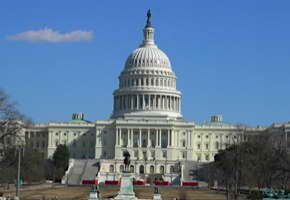December 13, 2010
12/13: Cutting the Deficit Should Be Next Session’s Main Concern
Regardless of the current focus on the Bush-era tax cuts, voters do not want taxes to be the top priority of the next Congress. According to 47% of voters, reducing the deficit should be the first item on their agenda. Maintaining services and benefits is viewed by nearly three in ten voters — 28% — as the key item on the next Congress’ list while 22% think cutting taxes should be their priority. Only 3% are unsure.
 Click Here for Complete December 2010 USA McClatchy-Marist Poll Release and Tables
Click Here for Complete December 2010 USA McClatchy-Marist Poll Release and Tables
Although majorities of Republicans — 55% — and independents — 55% — want Congress to focus on reducing the deficit, a plurality of Democrats — 42% — think they should concentrate on maintaining services and benefits.
There is an age gap on this question. Older voters are much more concerned with cutting the deficit than are those between the ages of 18 to 29. 50% of those 45 and older think Congress should put its energies toward cutting the deficit while 38% of those younger than 30 agree.
Table: Next Congress’ Top Priority
Voters to Blame Congress if Decision on Bush-Era Tax Cuts Not Reached
If Congress and President Obama do not reach a final agreement and let the Bush-era tax cuts expire at year’s end, many registered voters nationwide will point a finger at Congress. According to this McClatchy-Marist Poll, 33% say Republicans in Congress will be mostly at fault while 29% say most of the blame rests on Congressional Democrats. About one in five — 19% — will hold President Obama accountable. 10% think all will share in the blame. Nine percent are unsure.
While nearly six in ten Democrats — 58% — will point a finger at Congressional Republicans, fewer than half of Republicans — 47% — will blame the Democrats in Congress. A notable 31% of Republicans will find the president at fault. Among independents, 32% will put the onus on the Republicans in Congress while 30% will blame the Democrats in Congress. 16% will point a finger at the president, and 11% blame all of them.
“Despite the expected passage of the tax cut issue, voters think there’s plenty of blame to go around,” says Dr. Lee M. Miringoff, Director of The Marist College Institute for Public Opinion. “There are many disgruntled feelings, not the least of which is that Congressional priorities are out of sync with public desires.”
Table: Bush-Era Tax Cuts – Blame
“Same old, Congress,” Say Voters
The new Congress will be seated in January, but how do voters think the current Congress is doing in the wake of this year’s midterm elections? Six in ten voters — 60% — say they are doing about the same. Almost one in five — 19% — think they are doing worse, and 16% report they are doing better. Just 5% are unsure.
And, so it’s probably no surprise, then, that many voters don’t believe Congress has learned a lot from this year’s midterm elections. Looking at Republicans in Congress, nearly four in ten voters — 37% — think Congressional Republicans have learned a little from this year’s midterm elections and an additional 22% believe they have learned nothing at all. 35%, however, say they have learned a lot, and 6% are unsure.
Democrats don’t fare better in the minds of voters. 35% think Congressional Democrats have taken away a little from the elections while 26% take it a step further and report Democrats learned nothing. 35%, though, say they have been enlightened, and 4% are unsure.
Table: Status of the Current Congress
Table: Lessons Learned from the Midterm Elections – Congressional Republicans
Table: Lessons Learned from the Midterm Elections – Congressional Democrats

